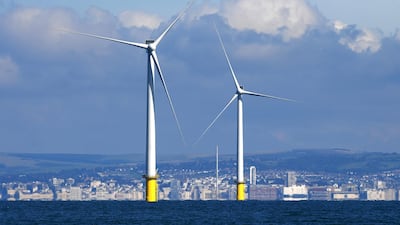An innovation centre at the University of Hull that helps businesses develop carbon-reducing ideas has been championed by a British business lobby for supporting the UK’s bid to be a beacon of green growth.
The university’s £12 million ($17m) Aura Innovation Centre offers space for companies of all sizes to deliver green innovation, in turn helping to sustain the UK as a global leader in offshore wind and the wider renewable energy sector.
It has been highlighted now by the Confederation of British Industry for its drive to create new technologies, businesses and jobs that will help the UK economy win the global race to net zero.
The CBI set out a series of changes on Monday that could be worth £700 billion in commercial growth over the next decade, with decarbonisation one of the key changes needed.
Britain has a “once-in-a-generation” opportunity to create 240,000 low-carbon jobs by 2030 and boost green exports by billions of pounds to transform the UK economy over the next decade, the CBI said.
Calling on companies to “seize the moment”, Tony Danker, director general of the CBI, said the nation can bounce back from the hit of Brexit and Covid-19 by encouraging decarbonisation and innovation, and levelling up its regions.
This would involve businesses working with trade unions, civil society and the government to cut carbon emissions to unlock the UK’s growth potential.
“Decarbonising our economy is a planetary imperative,” said Mr Danker. “We can use our transition to net zero to create green jobs, to find sustainable solutions and sell them to the rest of the world.”
A failure to make bold changes now “will result in a return to business as usual” and a continuation of “the persistently low productivity and heightened social division that followed the 2008 financial crisis,” Mr Danker said in a speech on Monday.
Britain’s economy suffered its worst recession in 300 years during the Covid-19 crisis, a slump that followed years of uncertainty caused by the decision to exit the European Union. With a recovery now under way, policymakers and analysts are debating how economies around the world can adapt to changes caused by the crisis.
“This country will never have a greater opportunity to transform our economy and society for the better than we have right now,” Mr Danker said. “This is the moment where we have a genuine chance to make big bets on how the U.K. economy will grow and compete.”
Mr Danker identified “six prizes” the UK can win if it completes the transformation, with an economy that is decarbonised, innovative, globalised, regionally thriving, inclusive and healthier.
The CBI argues that can be achieved through policies such as regulatory reform for investment and innovation and the creation of a new body, co-chaired by the Treasury, the Bank of England and the CBI, to help boost finance for growth and investment. It also suggests a “long-term tax road map” for the country that will help restore the pandemic-battered public finances.
But the negative impact on the planet from rising emissions is one of the CBI’s key targets, particularly as the UK is already a leader on the path to decarbonisation after becoming one of the first major economies to announce a net-zero target.
The group called on every individual and business in the UK to lower energy usage and reduce Co2 emissions, while it urged relevant sectors and firms to ramp up net-zero exports to fast-growing global markets.

This includes additional decarbonisation exports to the EU including electric vehicles and vehicle batteries worth £168bn, carbon capture, usage and storage worth £1bn, hydrogen electrolyser production worth £8bn, and offshore wind goods and services worth £3bn.
In turn, this could create 240,000 new jobs that could help to level up the UK’s labour market and improve the country’s physical and mental health through reduced air pollution.
“The UK has a genuine chance of being a world leader in areas like carbon capture and offshore wind as well as a significant player in electric vehicle,” the CBI said.
“We have a real opportunity to become a significant exporter of new green products and services. Ultimately getting behind net-zero is the right thing to do for our society.”


